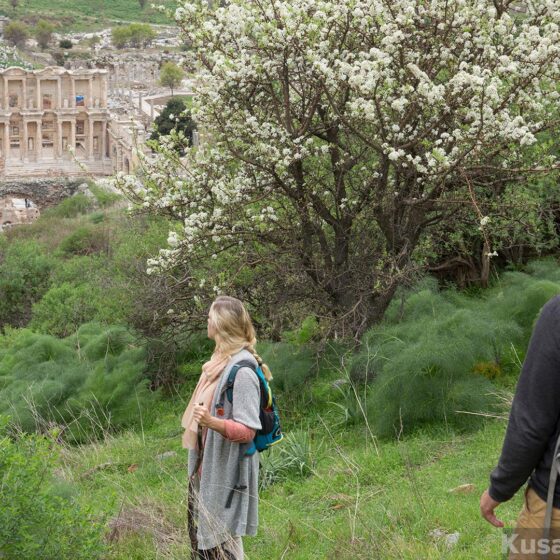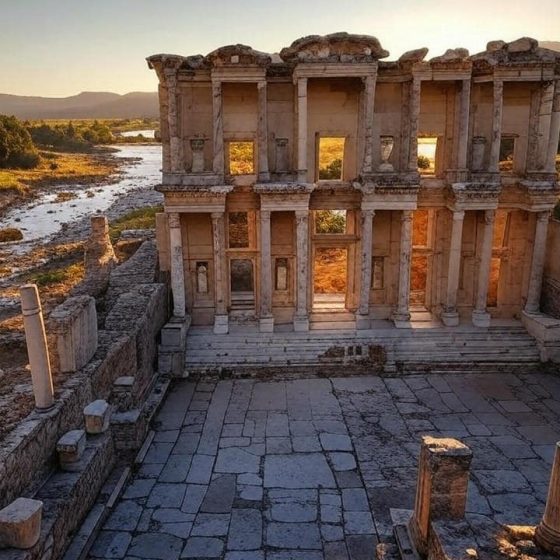Table of Contents Show
A single column sticks up from a quiet field near Selcuk, not far from Kusadasi’s busy coast. A White Stork sits on top, its nest adding a bit of life to this old spot. This is all that’s left of the Temple of Artemis at Ephesus, one of the Seven Wonders from long ago. Built back in the 6th century BCE, it was a big deal for people who came to pray to Artemis, the Greek goddess of hunting and having babies. In 2025, these stories of gods, fights, and strange events still hang around this place. I’ve looked into the tales and added some tips to visit. Let’s check them out.
The Amazons Started It
One old story says the Temple of Artemis began with the Amazons, tough women warriors from Greek tales. A poet named Callimachus wrote that they set up a wooden statue of Artemis under a tree here, dancing around it with shields and arrows before the big temple was made. This idea, found in stuff like Wikipedia, makes Ephesus sound like a place where women ruled, which fits Artemis being a strong goddess. But another guy, Pausanias, thought the spot was even older, going back to the Bronze Age, and digs from 1987-1988 back that up. Maybe it’s a mix—local ways from long ago mixed with Greek ideas, and the Amazons’ part could be a later add-on.
Artemis and Her Tough Side
Artemis shows up a lot in these stories, and she’s not one to mess with. She looked after the wild, hunting, and giving birth, and she didn’t like anyone crossing her. One scary tale, from ephesus.us and mythopedia.com, is about Actaeon, a hunter who saw her bathing by a stream. She got mad and turned him into a deer, and his own dogs killed him. This wasn’t just her being grumpy—it was a big warning that her temple was off-limits. In Ephesus, though, she was more about having babies, with statues covered in egg shapes or bull parts, not the bow-and-arrow type from Greece.
Another story, from theoi.com, tells of Lygdamis, a Scythian king who wanted to attack the temple. Artemis hit him and his army with a sickness, proving she could guard her place. The temple also let people hide there if they were in trouble, and some say the Amazons did this to escape fights with Dionysus and Heracles. Travelers, kings, and shoppers left gifts like jewelry, as Wikipedia mentions, making it a busy spot.
The Fire on Alexander’s Big Night
The most talked-about story is about the temple burning down in 356 BCE. A guy named Herostratus set it on fire just to get famous. The Ephesians rebuilt it bigger, but the weird part is the timing—people say it happened the night Alexander the Great was born, July 21, 356 BCE, according to Through Eternity Tours. The idea is Artemis was too busy helping with his birth to stop the fire—a link to her baby role. Later, when Alexander took over, the Ephesians told him this, and he gave the city some special rights, as ephesus.us notes. Some think the date was made up to impress him, though.
Punishments and Sickness
Artemis wasn’t soft—her stories show that. Theoi.com tells of Melanippos and Komaitho, lovers from Patrai who broke rules by being together in an Artemis temple. She sent a sickness until they were given up to fix it. This didn’t happen in Ephesus, but it shows how serious people were about keeping her temple pure. Another tale involves Aura, a Titaness who made fun of Artemis’ body, saying it was too womanly. Artemis got back at her by setting up an attack from Dionysus, a harsh lesson in respect. These tales made the temple a place people feared and honored.
The Fertility Goddess of Ephesus
In Ephesus, Artemis was different from the Greek version who hunted with friends. Here, she was about having babies, mixing Greek and Anatolian ways. Ephesus.us and World History Encyclopedia say her statue was stiff, covered in egg shapes—maybe breasts or bull parts—showing lots of life. This made her more like a mother goddess, not a virgin. A story from Acts 19:35 on Wikipedia says the Ephesians thought her image dropped from the sky, a gift that made her their big protector. This drew big crowds for the Artemis Procession in March and May, where young women carried her statue, as Pliny wrote.
The Christian Takeover: A Temple’s End
When Christianity grew, the temple’s stories turned dark. By the 4th century AD, Theodosius I stopped pagan worship, and the temple, already hurt by earthquakes and a 262 AD Gothic attack, couldn’t hold on. The Acts of John, from penelope.uchicago.edu, says John the Apostle prayed for it to fall, calling it a “delusive demon.” The crowd threw down Artemis’ statue, yelling, “Not from heaven didst thou descend; artisans made thee in a furnace.” By 402 AD, Prudentius wrote that “the huntress maid resigned Ephesus to Christ,” marking its end. Some say John Chrysostom helped, but others think monks and locals took it apart slowly, using the stones elsewhere.
Visiting the Temple in 2025
Now, the Temple of Artemis is a quiet spot with just that one column and some bits in a field near Selcuk. It’s free to see, a 20-minute dolmus ride from Kusadasi (30 Turkish lira), then a 1.5-kilometer walk or 15-lira taxi. Take 30–45 minutes to look around—new signs in 2025 tell the story, and the storks add a nice touch. Add a stop at the Ephesus Museum in Selcuk (100 lira) to see the Artemis statue with her egg designs. Grab lunch nearby—kebabs and baklava at a café cost 80–120 lira. Spring or autumn beats the summer heat, and early mornings avoid crowds.
The tales of the Temple of Artemis show a mix of cultures, beliefs, and big moments. From the Amazons’ start to Herostratus’ fire, Artemis’ anger to the Christian change, they tell how Ephesus brought different worlds together. In 2025, standing where people once prayed, you can feel that past in the air. Been there? Share your thoughts with me!
Last updated on March 9, 2025



